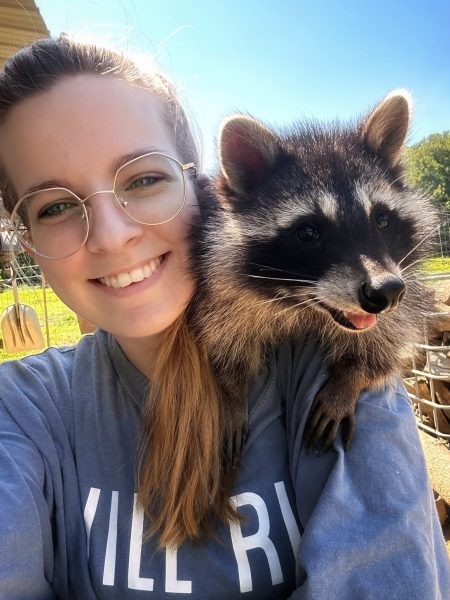Do Raccoons Make Good Pets? Raccoons as pets are a complex issue, blending their undeniable charm with the significant challenges of meeting their unique needs; this comprehensive guide by PETS.EDU.VN explores every aspect, providing insights and expert advice. Discover the realities of raccoon ownership, ensuring you’re well-informed before making a decision, and learn about alternative exotic pets.
1. Understanding Raccoons: More Than Just Cute Masks
Raccoons, scientifically known as Procyon lotor, are native to North America and are easily recognizable by their distinctive masked faces and ringed tails. They are highly intelligent, adaptable creatures that thrive in a variety of environments, from forests to urban areas. Their dexterous paws allow them to manipulate objects with ease, which contributes to both their problem-solving abilities and their mischievous nature. Before considering a raccoon as a pet, it’s crucial to understand their natural behaviors and needs.
- Intelligence: Raccoons are considered to be among the most intelligent animals, often compared to primates in their cognitive abilities.
- Adaptability: Their ability to thrive in diverse environments makes them opportunistic feeders and resourceful survivors.
- Nocturnal Nature: Raccoons are primarily active at night, which can pose challenges for owners who prefer a pet with a more compatible schedule.
- Destructive Potential: Their curious and manipulative nature can lead to significant property damage if not properly managed.
2. The Allure of Raccoons as Pets: Why People Are Tempted
Despite the challenges, the idea of keeping a raccoon as a pet is tempting for many. Their playful antics, combined with their apparent intelligence, can make them seem like engaging companions. Raccoons can form strong bonds with their human caregivers, displaying affection and loyalty. However, it’s essential to separate the romanticized view of raccoon ownership from the practical realities.
- Unique Appeal: Raccoons offer a novelty factor that traditional pets like dogs and cats cannot match.
- Potential for Bonding: When raised from a young age, raccoons can develop close relationships with their human families.
- Entertaining Behavior: Their curiosity and dexterity often lead to amusing and engaging antics.
- Misconceptions: Popular media sometimes portrays raccoons as cuddly and docile, which can be misleading.
3. Legal Considerations: Can You Even Own a Raccoon?
One of the first and most important steps in considering a raccoon as a pet is to research the legality of owning one in your area. Laws vary widely by state, county, and even municipality. Some jurisdictions outright prohibit raccoon ownership, while others require permits or licenses. Additionally, some areas may have restrictions on the source of the raccoon, such as prohibiting the possession of wild-caught animals.
- State Laws: Check your state’s Department of Natural Resources or Fish and Wildlife Agency for specific regulations.
- Local Ordinances: Contact your city or county government to inquire about any local laws or restrictions.
- Permitting Requirements: Be prepared to meet specific criteria, such as providing proof of secure enclosure and knowledge of raccoon care.
- Consequences of Illegal Ownership: Owning a raccoon in violation of local laws can result in fines, confiscation of the animal, and even legal charges.
4. The Challenges of Raccoon Ownership: More Than Just Cute Antics
Owning a raccoon is not like owning a dog or cat. They have very specific needs and behaviors that can be difficult to manage in a domestic setting. Understanding these challenges is essential for anyone considering taking on the responsibility of caring for a raccoon.
4.1. Housing and Enclosure Requirements
Raccoons are active and intelligent animals that require a spacious and secure enclosure to thrive. A cage is not suitable for a raccoon, as they need ample room to climb, explore, and engage in natural behaviors.
- Size: A minimum enclosure size of 10ft x 10ft x 8ft is recommended for a single raccoon.
- Security: The enclosure must be constructed of sturdy materials that can withstand a raccoon’s climbing and digging abilities.
- Enrichment: Include climbing structures, branches, digging areas, and puzzle toys to provide mental and physical stimulation.
- Climate Control: Raccoons are susceptible to extreme temperatures, so the enclosure should provide protection from heat, cold, and drafts.
4.2. Dietary Needs: More Than Just Trash Raiders
While raccoons are known for their scavenging habits, a proper diet is crucial for their health and well-being in captivity. Feeding a raccoon table scraps or relying on commercial pet food alone can lead to nutritional deficiencies.
- Balanced Diet: A raccoon’s diet should consist of a combination of high-quality protein, fruits, vegetables, and complex carbohydrates.
- Commercial Raccoon Food: Some specialized raccoon diets are available, but it’s essential to choose a reputable brand and consult with a veterinarian.
- Variety: Offer a wide variety of foods to ensure a balanced intake of vitamins and minerals.
- Avoid Toxic Foods: Chocolate, onions, garlic, and avocados are toxic to raccoons and should be strictly avoided.
4.3. Health Concerns: Vaccinations, Parasites, and More
Raccoons are susceptible to a variety of health problems, some of which can be transmitted to humans (zoonotic diseases). Regular veterinary care is essential for maintaining a raccoon’s health and preventing the spread of disease.
- Vaccinations: There is no approved rabies vaccine for raccoons, so vaccination is not typically recommended. However, other vaccinations, such as those for canine distemper and feline panleukopenia, may be advisable.
- Parasite Prevention: Raccoons are prone to internal and external parasites, such as fleas, ticks, and worms. Regular deworming and parasite control are necessary.
- Zoonotic Diseases: Raccoons can carry diseases that can be transmitted to humans, such as rabies, raccoon roundworm, and leptospirosis.
- Spaying/Neutering: Spaying or neutering is recommended to prevent unwanted breeding and reduce certain behavioral problems.
4.4. Behavioral Challenges: Destructive Tendencies and Aggression
Raccoons are naturally curious and intelligent animals, but these traits can also lead to destructive behaviors in a domestic setting. They are prone to chewing, digging, and climbing, which can result in significant damage to property. Additionally, raccoons can be aggressive, especially when they feel threatened or confined.
- Destructive Behavior: Raccoons may tear up furniture, chew on electrical cords, and dig through carpets.
- Aggression: Raccoons may bite, scratch, or hiss when they feel threatened.
- Nocturnal Activity: Their nocturnal nature can lead to disturbances for owners who prefer a quiet nighttime environment.
- Unpredictability: Even well-socialized raccoons can exhibit unpredictable behavior, especially during mating season.
4.5. Socialization and Training: Limited Effectiveness
While raccoons can be socialized to some extent, their training potential is limited compared to that of dogs or cats. They are independent thinkers and are not always motivated to comply with human commands.
- Early Socialization: Exposing young raccoons to a variety of people and environments can help them become more tolerant of human interaction.
- Positive Reinforcement: Using treats and praise can be effective in training raccoons, but consistency is key.
- House Training: House training a raccoon can be challenging, and accidents are likely to occur.
- Limited Obedience: Raccoons are unlikely to achieve the same level of obedience as a well-trained dog.
5. Finding a Raccoon: Where Do They Come From?
If you’ve carefully considered the challenges and are still determined to own a raccoon, it’s essential to acquire one from a reputable source. Wild-caught raccoons are not suitable as pets, as they are likely to be stressed and may carry diseases.
- Licensed Breeders: Look for breeders who specialize in raising raccoons for the pet trade.
- Rescue Organizations: Some wildlife rehabilitation centers or exotic animal rescues may occasionally have raccoons available for adoption.
- Avoid Wild-Caught Animals: Taking a raccoon from the wild is illegal in many areas and is detrimental to the animal’s well-being.
- Health Screening: Ensure that the raccoon has been health-screened and vaccinated by a veterinarian before bringing it home.
6. Raccoon Care: A Day in the Life
Caring for a raccoon is a full-time commitment that requires dedication, patience, and a willingness to adapt to their unique needs. A typical day in the life of a raccoon owner might involve:
| Time | Activity | Description |
|---|---|---|
| Morning | Enclosure Cleaning and Feeding | Cleaning the raccoon’s enclosure and providing a fresh, balanced meal. |
| Daytime | Enrichment and Interaction | Providing puzzle toys, climbing opportunities, and supervised playtime to keep the raccoon mentally and physically stimulated. |
| Evening | Socialization and Training (if applicable) | Spending time interacting with the raccoon and reinforcing any basic training commands. |
| Night | Monitoring and Supervision | Monitoring the raccoon’s activity and ensuring that it has a safe and comfortable environment to rest in. |
| Throughout | Veterinary Care and Health Monitoring | Regular checkups with a veterinarian who is experienced in treating raccoons, as well as monitoring the raccoon for any signs of illness or injury. |


7. Alternatives to Raccoons: Other Exotic Pets to Consider
If you’re drawn to the idea of owning an unconventional pet but are hesitant about the challenges of raccoon ownership, there are several other exotic animals that may be a better fit.
- Skunks: Domesticated skunks, with their scent glands removed, can make affectionate and playful pets.
- Sugar Gliders: These small marsupials are known for their gliding ability and social nature.
- Fennec Foxes: These small, desert-dwelling foxes are relatively low-maintenance and can be litter-box trained.
- Hedgehogs: These insectivores are relatively easy to care for and have a unique appearance.
8. The Importance of Responsible Ownership: Prioritizing the Animal’s Well-Being
Ultimately, the decision of whether or not to own a raccoon should be based on a thorough understanding of the animal’s needs and a commitment to providing the best possible care. Responsible ownership means prioritizing the animal’s well-being above all else, even if it means making difficult choices.
- Research: Thoroughly research the specific needs of the animal before acquiring it.
- Commitment: Be prepared to provide a lifetime of care, including housing, food, veterinary care, and enrichment.
- Ethical Considerations: Consider the ethical implications of owning an exotic animal and whether it is truly in the animal’s best interest.
- Alternatives: If you are unable to provide the necessary care, consider supporting wildlife conservation efforts or volunteering at a local animal shelter instead.
9. Raccoons in the Wild: Appreciating Them from a Distance
While the idea of owning a raccoon may be appealing, it’s important to remember that they are wild animals and are best appreciated in their natural habitat. Supporting wildlife conservation efforts can help ensure that raccoons and other wild animals continue to thrive in the wild.
- Wildlife Conservation: Donate to organizations that protect raccoon habitats and promote responsible wildlife management.
- Education: Learn more about raccoons and their role in the ecosystem.
- Responsible Wildlife Viewing: Observe raccoons from a safe distance and avoid feeding or approaching them.
- Coexistence: Learn how to coexist peacefully with raccoons in your community, such as securing garbage cans and preventing access to your home.
10. Expert Advice from PETS.EDU.VN: Making an Informed Decision
At PETS.EDU.VN, we understand the allure of exotic pets, but we also recognize the importance of making informed decisions that prioritize the animal’s well-being. Our team of experts is dedicated to providing comprehensive information and guidance to help you navigate the complexities of pet ownership.
- Consultations: Schedule a consultation with one of our experts to discuss your specific situation and get personalized advice.
- Educational Resources: Access our extensive library of articles, videos, and guides on a wide range of pet-related topics.
- Community Forum: Connect with other pet owners and share your experiences and insights.
- Service Directory: Find reputable veterinarians, breeders, and other pet-related service providers in your area.
Making the right choice for you and any animal requires carefully weighing the pros and cons. Raccoons are undoubtedly fascinating creatures, but their needs can be incredibly challenging to meet. Before deciding to bring one into your home, take the time to fully understand what’s involved and whether you’re truly prepared for the commitment.
Remember, PETS.EDU.VN is here to help you every step of the way with expert guidance and resources.
Have more questions or need personalized advice? Contact us today: 789 Paw Lane, Petville, CA 91234, United States. Whatsapp: +1 555-987-6543. Visit our website at PETS.EDU.VN for more in-depth information.
FAQ: Raccoons as Pets
1. Is it legal to own a raccoon?
Laws vary widely by location; check both state and local regulations before considering a raccoon as a pet.
2. What do raccoons eat?
In captivity, raccoons require a balanced diet of high-quality protein, fruits, vegetables, and complex carbohydrates, often supplemented with specialized raccoon food.
3. Are raccoons dangerous?
Raccoons can be aggressive, especially when threatened, and can carry zoonotic diseases like rabies and raccoon roundworm.
4. Can raccoons be house-trained?
House-training a raccoon can be challenging, and accidents are likely to occur due to their natural instincts.
5. What kind of enclosure does a raccoon need?
Raccoons need a spacious, secure outdoor enclosure with climbing structures, digging areas, and protection from the elements.
6. How intelligent are raccoons?
Raccoons are highly intelligent, often compared to primates in their cognitive abilities, which makes them challenging to care for.
7. Are there vaccinations for raccoons?
There is no approved rabies vaccine for raccoons, making regular veterinary care crucial for other potential health issues.
8. Can raccoons be trained?
Raccoons have limited training potential compared to dogs or cats; they are independent and not always motivated to comply with commands.
9. What are the alternatives to owning a raccoon?
Consider other exotic pets like skunks, sugar gliders, fennec foxes, or hedgehogs, which may be easier to care for.
10. Where can I find reliable information about raccoon care?
pets.edu.vn offers comprehensive information and expert advice on exotic pets like raccoons, including care guidelines and legal considerations.
